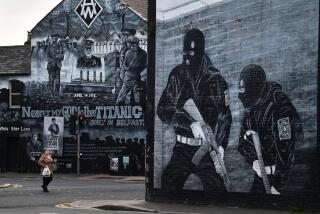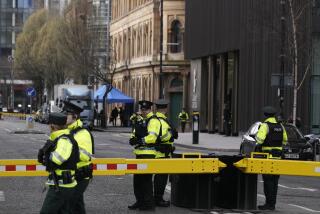Violence Marks Anniversary of British Troops in N. Ireland
- Share via
LONDONDERRY, Northern Ireland — Two bombs, one in Londonderry and the other in Belfast, exploded late Monday amid scattered rioting marking the 20th anniversary of the arrival of British troops in Northern Ireland.
Police said the Londonderry bomb was thrown at an armored police Land Rover, and the blast rocked the vehicle and broke windows in nearby homes but injured no one.
The Belfast bomb, also apparently aimed at security forces, exploded in the Roman Catholic Ardoyne district, according to police. They gave no details.
Elsewhere, police fired plastic bullets to disperse youths who set fire to four vehicles. Police said there were no injuries in the incidents in mainly Catholic West Belfast, the blue-collar stronghold of the outlawed Irish Republican Army. They said two buses, a van and a truck were hijacked and set afire.
Demonstrators picketed police stations, chanting: “What do we want? Troops out now!”
About 100 demonstrators carrying placards reading “End British Rule in Ireland Now” protested at the Springfield Road police station in West Belfast.
Northern Ireland’s 30,000-member security forces were on alert for fear of an IRA bombing campaign coinciding with the anniversary.
In London, British police warned the public to watch out for bombs, and security was tightened at British military bases in Europe.
In Londonderry, the city center was sealed off after two suspected bombs were discovered.
Bus service was halted after rioters set ablaze two buses in the city, where British troops first appeared 20 years ago to prevent civil war between Protestants and Roman Catholics.
Nationalists marked the occasion with a big parade attended by the leaders of Sinn Fein, the IRA’s political wing. British soldiers were kept out of sight during the march.
British troops were sent into Londonderry on Aug. 14, 1969, after sectarian rioting engulfed the city for two days and nights and the exhausted police could no longer maintain order.
The troops were welcomed at first by the Roman Catholic minority as their saviors from Protestant mobs. But now, in the nationalist districts of Belfast and Londonderry and in border areas known as “bandit country,” they are loathed as an occupying force.
More to Read
Sign up for Essential California
The most important California stories and recommendations in your inbox every morning.
You may occasionally receive promotional content from the Los Angeles Times.










